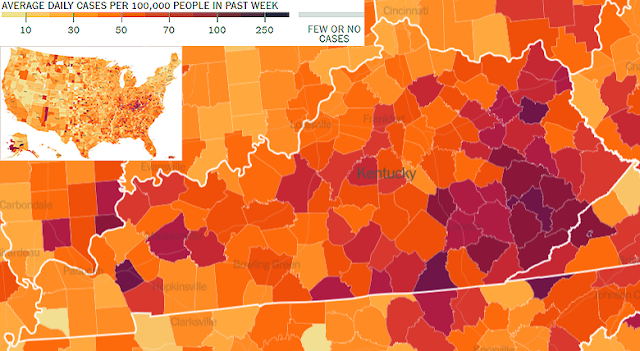The pandemic is on a rough plateau in Kentucky, which still has highest rate of new coronavirus cases of any state in last 7 days

New York Times maps show Kentucky is the U.S. hotspot, mainly because of southeastern counties.
—–
By Al Cross
Kentucky Health News
The state’s latest report for the Monday-through-Sunday reporting week showed 12,381 cases, down from 14,409 the previous week. The daily average declined to 1,769 from 2,058.
In a statistical anomaly, the state Department for Public Health‘s incidence rate of new cases per 100,000 population rose to 41.07, from 35.32 the week before. Susan Dunlap, spokeswoman for the department, said the rate “includes only newly reported cases that had onset/test date in the prior 14 days. By doing this, older cases that are reported late do not artificially inflate the weekly case counts. Covid-19 surveillance data are dynamic and subject to change as data are reviewed.”
The state report showed the counties with the top 10 rates were Harlan, 218 per 100,000; Wolfe, 169.7; Perry, 133.7; Leslie, 105.6; McCreary, 99.5; Knox, 91.3; Powell, 89; Martin, 88; Whitley, 84.3; and Knott, 83. The New York Times said McCreary had the nation’s highest rate over the last week, 185 per 100,000, followed by Perry at 156. Other Kentucky counties high in the Times list Monday were Rockcastle, Harlan, Knott, Letcher, Knox, Breathitt and Jackson, ranging from 127 to 99 per 100,000.
Kentucky’s rate has led the nation for more than a week on the Times report, not counting U.S. territories such as Puerto Rico and Guam. Among the states, West Virginia ranks second, followed by Alaska, Mississippi, Alabama, Tennessee, South Carolina, North Carolina, Georgia and Oklahoma.
In every region of the U.S., “All metrics (reported cases, test positivity rate, hospitalizations, and wastewater) remain high but have clearly peaked and well into their descent,” California epidemiologist Katelyn Jetelina reports on her Your Local Epidemiologist newsletter on Substack.
The state report showed the percentage of Kentuckians testing positive for the coronavirus in the last seven days rose slightly, to 18.96% from 18.51%. The numbers do not include results of at-home tests.
The report showed 570 patients with Covid-19 in Kentucky hospitals, down from 615 a week earlier. Those in intensive care numbered 76, up two, and those on mechanical ventilation fell by one, to 26.
The state attributed 63 more deaths to Covid-19, or nine per day. That was down from the previous week’s figure of 76, which was the highest in 12 weeks. The state’s pandemic death toll is 16,603.
In other pandemic news Monday:
Pfizer and BioNTech applied to the Food and Drug Administration for emergency use of a new coronavirus booster. “This adapted bivalent vaccine booster – meaning it stimulates an immune response for both the original virus strain and the Omicron variant – would target the BA.4/BA.5 Omicron subvariant in people 12 and older,” reports Sabrina Malhi of The Washington Post.
“Given the ongoing evolution of SARS-CoV-2 and its variants, it’s of great importance that vaccines can be rapidly adapted to the major circulating Omicron lineages,” said Ugur Sahin, CEO and co-founder of BioNTech, a German firm. Clinical trials of the new booster are expected to start this month.
The virus continues “mutate at a remarkable rate,” Your Local Epidemiologist reports. “Another Omicron subvariant, BA.2.75, is on the horizon. . . . It will likely take over in the U.S., but relatively slowly, causing a small blip on our radar. Another possibility is that, for the first time, we see two subvariants co-circulating at the same time.”
Jackie Starkey of the Lexington Herald-Leader answers readers’ questions about Covid-19 testing, undercounted cases and more.